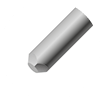Common steel nails are extensively used in pallet nailing lines and the construction industry. These nails are packaged in robust boxes that efficiently stack, conserving valuable warehouse space. Notably, their defining feature is the broad, flat heads that not only offer a larger surface area but also enhance load-bearing capacity and mitigate material pulling risks. The shank of these nails is relatively thick compared to other types, contributing to heightened structural integrity and resistance to bending or breaking during installation. Additionally, common steel nails can be fortified with a helical or ring shank for even greater resilience against structural stresses. Crafted from SAE 1010-grade steel, our nails embody strength, durability, and flexibility, while a range of finishes, from galvanized to vinyl-coated, further bolsters their resistance to corrosion in demanding environments. Also, we are a certified manufacturer of EPAL nails.
| Ø, mm | Length, mm | Screw | Ring | Smooth |
|---|---|---|---|---|
| 21 | 25-60 | + | + | + |
| 23 | 25-60 | + | + | + |
| 25 | 30-100 | + | + | + |
| 28 | 32-100 | + | + | + |
| 30 | 32-100 | + | + | + |
| 31 | 32-100 | + | + | + |
| 32 | 32-100 | + | + | + |
| 33 | 32-100 | + | + | + |
| 34 | 32-100 | + | + | + |
| 36 | 32-100 | + | + | + |
| 38 | 32-100 | + | + | + |
| 40 | 32-100 | + | + | + |
| 42 | 32-100 | + | + | + |
500-1000 kgbig carton box | |
1 boxon a pallet |
25 kgsmall carton box | |
36 boxeson a pallet |
Nails can be packed in unlabeled carton boxes or carton boxes with our logo.
On request, individually selected logos, texts or other graphics may be printed on the packaging.
Other packaging options are available upon request.
FAQ
1. What is a common nail and where it is used?
Common nail is the simplest version of a nail. They are mostly used in construction, fastening various wooden structures, pallet and crate manufacturing, DIY projects, etc.
2. What nail sizes should I use for construction?
The most common nail size in frame house construction is 90 mm. long or in other words 16d nails. At a hardware store, you may see two types of 16d nails, sinkers, and common nails. Sinker nail is an upgraded version of a common nail. It has a checkered pattern on the nail head and a sleeker shank diameter which makes this type of nail more suitable for framing.
3. What is the difference between nail shank types?
A smooth shank allows for nails to enter the material more easily. Ring shank nails have very high initial withdrawal resistance. Therefore, they are used in many wood framing and sheathing applications. Screw shank nails twist and rotate as it is driven into the wood. As it spins into the wood, it twists the wood fibers increasing resistance to withdrawal.
4. What is the difference between nail point types?
Diamond point is the most common nail tip. It gives the best possible penetration into the material. Clinch point nails are used to secure boards of pallets and other wooden structures. The clinched nail tip bends easily under the metal base. Blunt point nails prevent the wood from splitting when driven. It breaks through the wood fibers instead of splitting them.
5. What are common nail finishing types?
Electro-galvanized (white) nails have a 12μ layer of zinc which offers corrosion protection. They are generally used in areas where minimal corrosion protection is needed.
Electro-galvanized (yellow) nails offer the same corrosion protection as white galvanized nails the only difference is the color.
Vinyl coated nails use a slick vinyl coating for easier nail driving into the material. When it is driven for a moment vinyl heats up by the friction and then quickly cools down, hardening the vinyl coating which acts as the glue. However, this coating does not protect the nail from corrosion.6. What is the price of common nails?
Raw material prices are constantly changing so it is difficult to set constant prices. To get a quotation on our updated product prices, please contact us via email or fill out the inquiry form on our product page.








